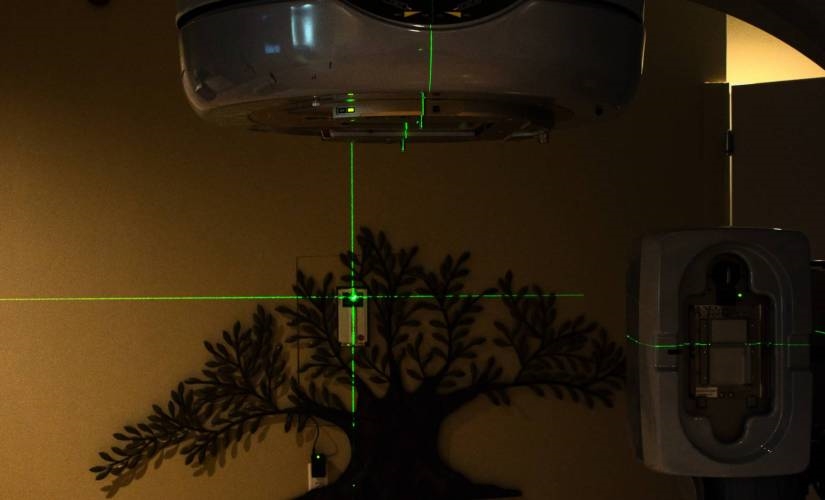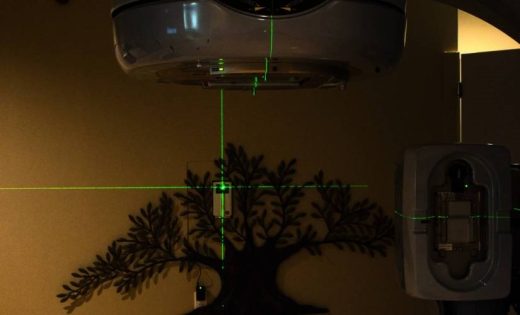AI Technology Drastically Cuts Treatment Time for Cancer Radiotherapy
AI Technology Drastically Cuts Treatment Time for Cancer Radiotherapy

Artificial intelligence (AI) technology has emerged as a game-changer in the field of cancer radiotherapy. With the ability to significantly reduce the waiting time for patients, this cutting-edge technology is set to be offered at cost price to all NHS trusts in England. By precisely calculating the direction of therapeutic radiation beams, AI helps doctors in targeting cancerous cells while sparing as many healthy ones as possible.
For over a decade, researchers at Addenbrooke’s Hospital have been working tirelessly to develop this groundbreaking AI program. Collaborating with Microsoft, they trained the AI program, called InnerEye, using data from previous patients. Traditionally, doctors spend between 25 minutes and two hours contouring or outlining bones and organs on around 100 scan cross-sections for each patient. However, InnerEye accelerates this process by working two and a half times faster.
The significance of this technology becomes apparent when considering the treatment of sensitive areas such as the prostate gland, head, and neck cancers. In these cases, medical professionals aim to avoid damaging nearby organs like the bladder or rectum, which can lead to lifelong continence issues. Dr. Raj Jena, a leading expert at Addenbrooke’s Hospital, explains, “That can get so bad that a patient’s life becomes dominated by that. I know patients where they’ve got a map of the cities that they’re going to, so they know where all the loos are.”
The collaboration between Addenbrooke’s Hospital and Microsoft has resulted in a breakthrough technology that significantly reduces the time required for contouring. While doctors typically spend hours carefully contouring scan images, the AI program completes the task much faster, allowing medical professionals to focus on other crucial aspects of patient care.
“We are very excited about the potential of AI in replacing some processes and procedures, including within diagnostics and cancer therapy,” states Dr. Katharine Halliday, President of the Royal College of Radiologists. AI has the capability to speed up the diagnostic process, enabling doctors to catch diseases earlier and providing patients with the best possible chance of recovery.
It is important to note that the AI program is not intended to replace clinical radiologists, but rather to enhance their capabilities. While doctors still review and verify the contours drawn by the AI program, it has demonstrated an impressive accuracy rate of approximately 90%. Clinicians approve the AI’s work without any corrections about two-thirds of the time. This high level of accuracy has even led some consultants to prefer the AI’s work over that of their human colleagues.
“AI shows great promise and will certainly help free up time for a workforce under strain, but it cannot replace highly trained and skilled professionals,” emphasizes Dr. Halliday. AI, with its data-driven insights and accuracy, complements the expertise of clinical radiologists, making it a formidable force in patient care.
The development of this AI program marks a significant milestone in the NHS’s investment in AI projects. As the first NHS-developed AI program released as a medical-imaging device, InnerEye represents a major step forward in leveraging AI for improving patient outcomes. The NHS Artificial Intelligence Laboratory provided £500,000 in funding to Addenbrooke’s Hospital for the necessary safety checks and evaluations.
Now, the program is being made available to a manufacturer who has agreed to provide other NHS trusts access to the cloud-based technology at cost price. This initiative demonstrates the commitment of the NHS to harness the potential of AI and ensure that cutting-edge technologies are accessible to all patients across England.
The integration of AI in cancer radiotherapy is undoubtedly transforming the landscape of patient care. By reducing the time spent on contouring and improving the accuracy of treatment planning, AI empowers doctors to deliver more precise and efficient therapies. Patients can benefit from minimized side effects and an improved quality of life during and after treatment.
As AI continues to evolve and revolutionize healthcare, it is crucial to strike a balance between the advancements brought by technology and the irreplaceable expertise of medical professionals. The combination of AI and clinical radiologists holds the potential to drive significant improvements in patient care, catching diseases earlier, and offering optimal chances of recovery.
With the NHS leading the way in AI implementation, we can expect to witness further innovations and breakthroughs in cancer treatment and diagnostics. As AI becomes an integral part of healthcare, it is poised to enhance patient outcomes and revolutionize the future of medicine.
First reported on CNN
The post AI Technology Drastically Cuts Treatment Time for Cancer Radiotherapy appeared first on ReadWrite.
(9)


